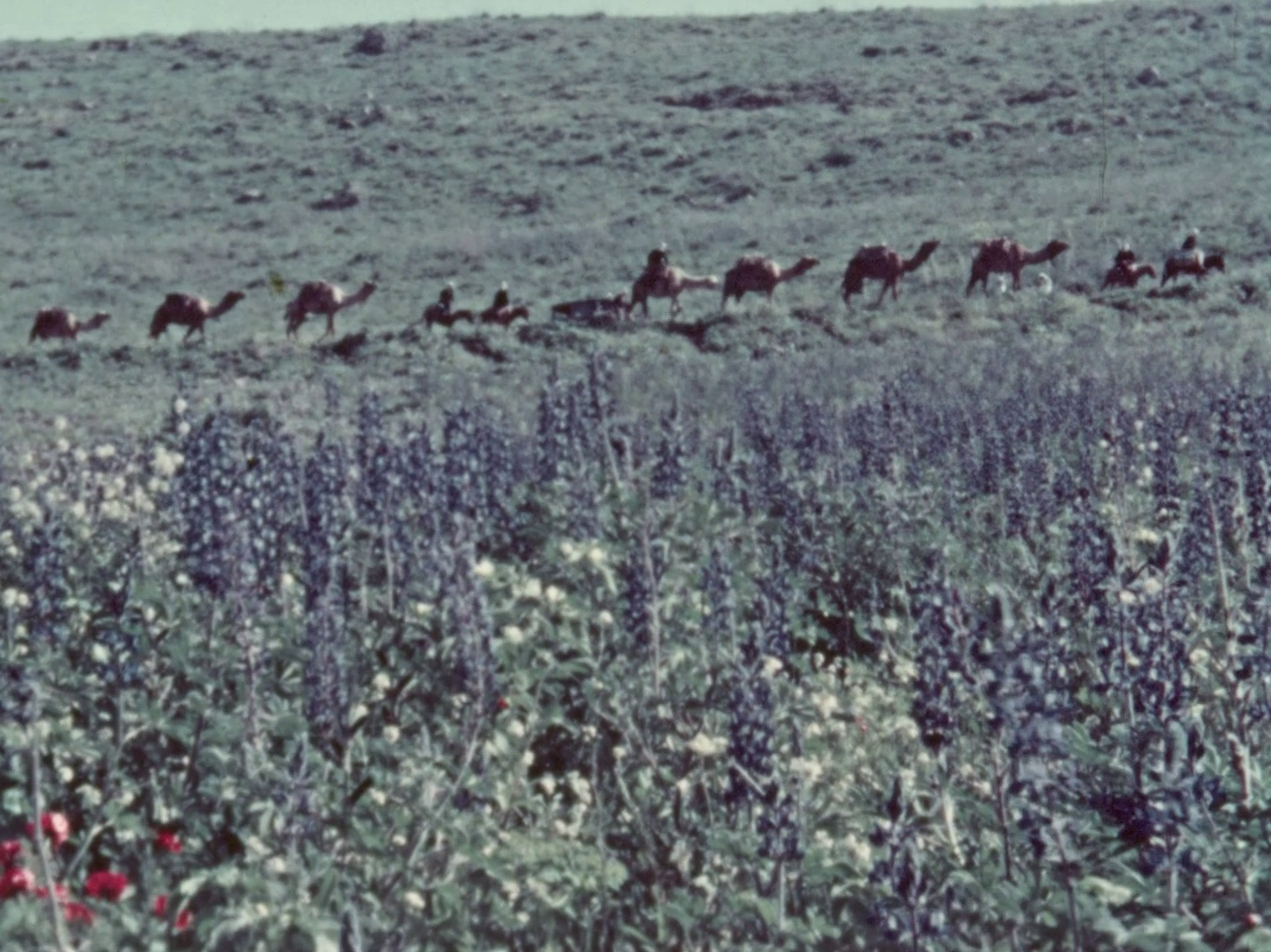
THE FLOWERS STAND SILENTLY, WITNESSING
When a filmmaker of Palestinian descent based in Scotland unearths a rarely-seen Scottish film archive of Palestinian wildflowers, he decides to reclaim the footage. This tender film essay questions the role of image-making as a tool of both testimony and violence when connected to entanglements between people and the land.
Directed and Edited by: Theo Panagopoulos
Produced by: Marissa Keating
Sound Design by: Hannan Jones
Music Composition by: Alexandra Katerinopoulou
Script Consulting by: Erica Monde
Graphics by: Hazar Marji
Arabic Translation by: Fatma Hegazy
Online editing by: Kaspar Vidunas
Developed, Supported and Executive Produced by the Scottish Documentary Institute’s Bridging the Gap Programme and Screen Scotland


FESTIVALS / SCREENINGS
Nominated for EE BAFTA British Short Film (link)
Edinburgh International Film Festival, August 2024 (Edinburgh, UK) (link)
Winner Best Short Film - International Documentary Festival Amsterdam (IDFA), November 2024 (Amsterdam, Netherlands) (link)
Documentary Short Special Mention - London Short Film Festival, January 2025 (London, UK) (link)
Winner Short Film Grand Jury Prize - Sundance Film Festival, January 2025 (Park City, USA) (link)
Group exhibition, SOIL: The World on Our Feet - Somerset House, January-April 2025 (London, UK) (link)
Slamdance Film Festival, February 2025 (Los Angeles, USA) (link)
True/False Film Fest, February/March 2025 (Missouri, USA) (link)
Special Mention Short Film - Sebastopol Documentary Film Festival, March 2025 (Sebastopol, USA)
Glasgow Short Film Festival, March 2025 (Glasgow, UK) (link)
Winner Best Short Film - Salem Film Fest, March 2025 (Salem, USA) (link)
Movies that Matter Festival, March 2025 (The Hague, Netherlands) (link)
Vera Film Festival, March 2025 (Mariehamn, Finland) (link)
REGARD Festival international du court métrage, March 2025 (Saguenay, Canada) (link)
Winner Innovative Production Award - Crossing the Screen Film Festival, March 2025 (Eastbourne, UK)
Zagrebdox International Documentary Festival, March/April 2025 (Zagreb, Croatia) (link)
Winner International Short Documentary & European Film Academy Candidate 2025 - Go Short International Short Film Festival, April 2025 (Nijmegen, Netherlands) (link)
Other Cinemas: Agri/Cultural Resistances, April 2025 (London, UK) (link)
Chronic Youth Film Festival, April 2025 (London, UK) (link)
AFSAD International Short Film Festival, April 2025 (Ankara, Turkey)
Hot Docs Canadian International Documentary Festival, May 2025 (Toronto, Canada) (link)
Texts/Reviews
Theo Panagopoulos’s new film essay The Flowers Stand Silently, Witnessing (2024) exposes the West’s colonial, and thus racialised, relationship to land – one that depends on the pastoral image as its decisive weapon. Panagopoulos, a Greek-Palestinian filmmaker based in Glasgow, was conducting research in the National Library of Scotland’s Moving Image Archive when he came across early colour footage of wildflowers in Palestine, shot by Scottish missionaries in the 1930s and 40s. The original footage lingers on the pastoral beauty of Palestine, rather than the lived realities of a land and people under British occupation. As Panagopoulos writes in chilling onscreen text: ‘these images of flowers hid violence in beauty’. So he set about cutting and splicing the colour-saturated frames of flowers and windblown hillsides, lakes and mountains, children and mothers and husbands, into his own narrative, ‘reclaiming the footage as a form of testimony… as a form of resistance to cultural erasure’, he reflects in the exhibition catalogue. Panagopoulos layers the footage with his spare ruminations, first in English text and then Arabic. Positioned in the centre of each frame, his text seems to interweave with the poppies and blossom that make up the background; in doing so, he appropriates and then disrupts a settler’s image of rural and agrarian living.
Rose Higham-Stainton - ArtReview Magazine
“It is remarkable how a seemingly naive and idyllic, almost century-old color film holds profound insights into the colonial power dynamics, as seen through the eyes of the observer. By uncovering hidden layers, the work transforms vivid, beautiful images and overlooked presences into powerful reflections on the act of filming as an assertion of power. These rediscovered depictions remind us of our shared humanity and serve as a poignant warning against the perils of forgetting. The film masterfully reclaims archival footage, highlighting the overlooked presence of Arab Palestinians. Through its delicate editing, it transforms misrepresentation into presence, challenging history’s omissions with quiet, evocative power.”
Short Documentary Competition Jury - IDFA 2024
“Through a powerful reappropriation of archive footage, this film creates a haunting meditation on land, loss, and memory. This is a bold work from an emerging voice that dares to imagine a different future whilst confronting an unbearable present. What particularly moved the jury was the raw honesty within the filmmaker’s process, and how the absence of Palestinian people in these historical images speaks volumes about erasure and existence. The filmmaker’s deeply personal approach and innovative intervention in reclaiming the historical imagery directs the audience to contemplate both the beauty of Palestine and the ongoing tragedy of its people, whilst the thoughtful sound design and centred Arabic text transform archival colonial footage into an act of resistance and hope.”
Short Documentary Competition Jury - London Short Film Festival 2025
“The Floral Beauty of the Holy Land and Wild Flowers of Palestine are two beautiful 16mm silent colour films made in the 1930s by a Scottish missionary to document the flora of the region, then under British rule. Greek-Lebanese-Palestinian documentary filmmaker Theo Panagopoulos uncovered the films in a Glasgow film archive while doing some PHD research, and here reclaims the footage to create a stunning essay film that acts as a form of resistance while showing people connected to the rural land around them.”
Philip Ilson, Co-Director, London Short film Festival
The Best of 2024 Edition: Festival Formula
“Archival research as embalming practice, a radical act of resistance suffused with anger, gentleness, nostalgia, and ardour. Let films be a conduit for liberation. Let them free you from the shackles of privilege and passivity. Let them invite you to chant “Free Palestine!” until we will ultimately manifest that reality together.”
Ren Scateni, film curator and writer
Listed: TOP 3 of 2024, Talking Shorts
“This is an absolutely remarkable work of archival repurposing, and I’m so glad to see it getting its due. A poetic interrogation of two silent botanical films shot in Palestine by a Scottish missionary in the 1930s and 1940s, it asks crucial questions about the nature of audiovisual records and about what common colonial impulse links the creation of this footage to the most violent images we see coming from the same land today.”
Oisín Kealy, Programme Manager Glasgow Short Film Festival
Listed: TOP 3 of 2024, Talking Shorts
“An archival footage of breathtaking, seemingly innocent floral landscapes is powerfully reused to expose the unseen oppression of the Palestinian people. No one is free until everyone is free.”
Emilia Mazik, selection committee member Film Fest Gent & Glasgow Short Film Festival, Head of Industry Kaboom Animation Festival
Listed: TOP 3 of 2024, Talking Shorts
“For its subtle exploration of Palestine past’s and natural beauty of the land. Combined with the filmmaker’s text, an unsettling score, references to current atrocities on the same land, it becomes extremely powerful and timely. A quiet, reflective experience that stays with the viewer.”
Best Innovative Production Award Jury Statement - Crossing The Screen